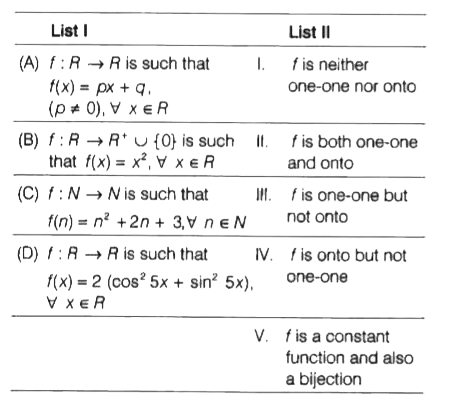In a triangle ABC, if a2−b2−c2=bc(λ2−2λ−1), thenSolution in Telugu
0≤λ≤4
−1≤λ≤2
−1≤λ≤3
0≤λ≤3
The correct Answer is:C
Step by step video, text & image solution for In a triangle ABC, if a^(2)-b^(2)-c^(2)=bc(lambda^(2)-2lambda-1), then by Maths experts to help you in doubts & scoring excellent marks in Class 12 exams.
Updated on:21/07/2023Topper's Solved these Questions
Similar Questions
If f:R→R,g:R→R are defined by f(x)=5x−3,g(x)=x2+3, then (gof−1)(3)=
View SolutionMatch the following

The correct answer is
View SolutionLet f,g,h be the lengths of the perpendiculars from the circumcenter of the Delta ABC on the sides BC,CA and AB respectively.If (a)/(f)+(b)/(g)+(c)/(h)=lambda(abc)/(fgh), then the value of 'lambda' is (B) (1)/(2) (B) (1)/(2) (D) (1)/(2) (D) 2
View SolutionIf the bisector of the angle A of triangle ABC meets BC in D, prove that a=(b+c)[1-([AD]^(2))/(bc)]^((1)/(2))
View SolutionIf a,b,c are the sides of a triangle ABC such that x^(2)-2(a+b+c)x+3 lambda(ab+bc+ca)=0 has real roots.then
View SolutionThe vertices of a triangle ABC are (lambda,2-2lambda), (-lambda + 1, 2lambda) and (-4-lambda, 6-2lambda). If its area be 70 units then number of integral values of lambda is (a) 1 (b) 2 (c) 4 (d) 0
View SolutionIn a triangle ABC,(a+b+c)(b+c-a)=lambda bc if
View SolutionIn a triangle ABC,bc cos^(2)(A)/(2)+ca cos^(2)(B)/(2)+ab cos^(2)(C)/(2)=
View SolutionIn Delta ABC, if cos A+2cos B+cos C=2 and cot((A)/(2))+cot((C)/(2))=lambda cot((B)/(2)) ,then find the value of lambda
View SolutionIf [λ2−2λ+1λ−21−λ2+3λ1−λ2]=Aλ2+Bλ+C, where A, B and C are matrices then find matrices B and C.
View SolutionIf in a triangle ABC,bc2cosA=b2+c2−2bccosA then prove that the triangle must be isosceless
View SolutionABC is an isosceles triangle with AC = BC. If AB2=2AC2, prove that ABC is a right triangle.
View SolutionIf [λ2−2λ+1λ−21−λ2+3λ1−λ2]=Aλ2+Bλ+C, where A, B and C are matrices then find matrices B and C.
View SolutionIn triangle ABC, range of a2+b2+c2ab+bc+ca is (a,b,c are sides of triangle)
View SolutionIf [λ2−2λ+1λ−21−λ2+3λ1−λ2]=Aλ2+Bλ+C, where A, B and C are matrices then A+B=
View Solution

